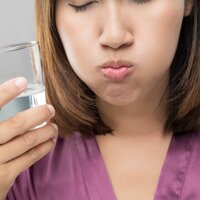There are no products in your shopping cart yet.
Dry mouth during menopause and perimenopause.

A dry mouth during menopause is an unpleasant symptom. What causes it, and how can you resolve it? One of the signs that it may be time to switch from using progesterone cream to menopause cream is when you start experiencing a dry mouth and/or lips. This occurs because estrogen plays a crucial role in maintaining the moisture levels in your mouth and lips.
Dry Mouth During Menopause
A dry mouth can be a symptom of menopause and may even begin during perimenopause. Menopause is the period that begins after a year of no menstruation, while perimenopause is the time leading up to it, often starting around age 45. Symptoms gradually increase over time. Hormonal changes, particularly a decrease in estrogen levels, are the main cause of dry mouth.
Estrogen affects various tissues in the body, including the mucous membranes in the mouth (as well as in the vagina and eyes). A decline in estrogen levels can lead to changes in the composition and quantity of saliva, which can result in dry mouth, a condition known as xerostomia. Dry mouth occurs when the salivary glands do not produce enough saliva. In some cases, there may be saliva, but its quality is insufficient. In the worst-case scenario, you may experience difficulty speaking, eating, and swallowing.
Even if speaking, eating, and swallowing are still manageable, you might notice that your mouth just doesn’t feel quite right—just a bit too dry.
A dry mouth can lead to discomfort, difficulty swallowing, a burning sensation in the mouth, and an increased risk of tooth decay and other oral health issues. It’s important to maintain good oral hygiene and stay hydrated by drinking water regularly. In addition to hormonal changes, other factors such as certain medications, stress, smoking, and alcohol consumption can also contribute to dry mouth. It’s advisable to consult a doctor if you experience persistent dry mouth.
When women are in perimenopause, I usually recommend starting with progesterone cream, as 45 is generally too young for menopause cream. However, as the years progress and menopause approaches, symptoms can start to change. Hot flashes may become more frequent and intense, mood may worsen, vaginal dryness, and dry lips can occur. That’s when it’s time to switch to menopause cream.
What Is the Solution for Dry Mouth During Menopause?
To address dry mouth, you can stimulate saliva production by chewing thoroughly or avoiding foods that reduce saliva production, such as spicy foods, dry crackers, caffeine, and alcohol. Applying menopause cream to increase both progesterone and estrogen levels can also help. You’ll likely notice that your dry mouth improves fairly quickly.
It’s clear that remedies for dry mouth, dry eyes, or vaginal dryness only offer temporary relief—they are merely addressing the symptoms.
 English
English


